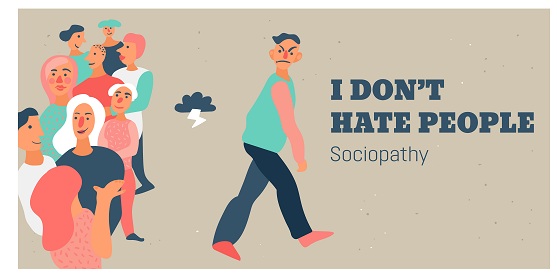It’s Time to End the Movie Stereotypes Surrounding Sociopathy

While it is true that diagnosed sociopaths are known for their lack of empathy and their inability to understand human emotions, the majority don’t fit the bad reputation that precedes them.
April 12, 2021
When most people picture a sociopath, they envision a heartless serial killer. While it is true that diagnosed sociopaths (those diagnosed with antisocial personality disorder) are known for their lack of empathy and their inability to understand human emotions, the majority don’t fit the bad reputation that precedes them. In fact, we likely encounter sociopaths — either undiagnosed or masking to socially blend — on a daily basis.
My family friend, Dave*, was diagnosed with sociopathy as a young child. Contrary to what one may believe, Dave has hardly hurt a fly. I sat down with him to talk about life as a sociopath.
Dave told me that, as a child, he casually dismissed his lack of emotion. Dave’s mother was not particularly emotional and therefore his lack of emotion was simply the product of his upbringing. When Dave was about six, he exhibited signs of hyper-aggressiveness — a symptom of sociopathy. At the time, however, Dave was diagnosed with anger issues.
Dave grew up in India, where he says it was customary to kill animals — those that had been raised for months — for food and religious sacrifices. Although an eventual desensitization to the process is normal, Dave had little initial reaction to the butchering. This behavior — or lack thereof — prompted further testing.
The terms psychopath and sociopath are often used interchangeably, but there is a difference. While there are formally accepted distinctions between the two, Dave sees the differences better in practice. Based on his own behavior and his diagnosis, he claims that psychopaths are cold, calculating, and more level-headed in their emotions. Dave believes that, as a sociopath, he is more unpredictable in his emotions, and that his tolerance for the fastidious behavior of others is considerably lower.
While some sociopaths do not feel emotions (and are referred to as “high-functioning”), Dave does experience emotions. But Dave — like many other sociopaths — does not have the ability to understand these emotions, the reasons behind their occurrence, and their normal effect on human behavior. This emotional abnormality resulted in Dave’s nonchalance towards death.
With the help of close family and friends, Dave has since been able to better integrate himself into society; Dave can now provide the appropriate emotional response in a given situation, and he lives quite normally. Of course, Dave bases his reactions on cues — which include body language, vocal intonation, sentence structure, and vocabulary choice. But everyone — sociopath or not — relies on social cues to determine responses.
Dave also utilizes a unique tool — what he calls the “Manipulation Filter” — in social situations. This “filter” enables Dave to determine the ways in which he can manipulate others to do his bidding. Through the “Manipulation Filter”, Dave maintains the power to twist words to his advantage. Over time, he has learned how to use the technique well — and only for the things he truly desires. Dave compares the tactic to the concept of Santa Claus: “The whole idea behind Santa is basically a yearlong manipulation from the parent to the children to stop children from behaving a certain way or doing certain things,” he says. “It’s akin to my manipulation as it isn’t necessarily harming anyone, and may actually be better in the long run.”
Only Dave’s immediate family and close friends know about Dave’s sociopathy. Yet Dave believes he has somewhat of a responsibility to share his diagnosis with others. Showing others that ‘normal’ people live with sociopathy breaks the movie-mold of heartless serial killer sociopaths; those with sociopathic loved ones are often forced to reimagine their internal image of a sociopath.
So, if Dave sees it as a duty to tell others that he is sociopathic — and if others’ reactions to this news are at worst neutral — why do so few people know that Dave is a sociopath? Dave believes his sociopathy is irrelevant information that could put a target on his back. In other ways, Dave’s sociopathy is an asset. Dave’s experience with sociopathy plays an essential role in his profession — helping those with mental illnesses to assimilate into regular life.
The public doesn’t associate sociopathy with someone like Dave, who — once undisturbed by the slaughtering of animals — lives normally and assists others with mental illnesses. But Dave’s story is much closer to reality. The vast majority of sociopaths do not become serial killers. The vast majority of sociopaths are fully functioning members of society. The vast majority of sociopaths are like the people that surround us everyday.
*In order to protect his identity, I will refer to my family friend as Dave.

